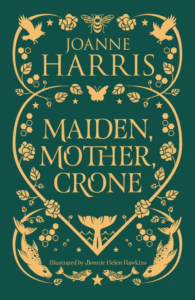Maiden, Mother, Crone. A collection
Joanne Harris, illustrated by Bonnie Helen Hawkins
Gollancz, 2023. 582 p. ISBN 978-1-3996-1401-6. £ 10.99, € 16,95
As a child I red lots of fairy tales and whole books with fairy tale collections from around the world. Mainly Europe, including Eurasia, some or North-American tales and the occasional story with Kantjil or Anansi in a leading role. Grimm, Andersen, Mother Goose; Greek myths; Gipsy tales, fairy tales from Russia, Scandinavia, and othe countries; the Finnish Kalevala; Celtic tales from Ireland and even a retelling of the Welsh Mabinogion. But never, as far as I can remember, British folktales: no English or Scottish stories, no Anglo-Saxon folktales.
So what a treat that Joanne Harris (‘The Gospel of Loki’, ‘Runelight’) has collected and retold stories from the British Isles, inspired by the ‘Child Ballads’. These 305 traditional ballads were collected and anthologized by Francis Child during the second half of the 19th century: the ‘Child Ballads’ or ‘The English and Scottish Popular Ballads’. Nothing about them is ‘childish’ (as anyone familiar with fairy tales would know, and I do not mean the children’s versions or Disney versions). And women are not often the heroine of the story. But in the retelling of Joanne Harris they are. And not necessarily in a traditional way.
‘A Pocketful of Crows’ is a story that is set in another world in the English countryside. When reading it, I noticed a certain rhythm in the telling that I cannot find again now I look for it. It seems the storyteller used rhythm, short sentences and something close to alliteration, that gave a rhythmic structure (cadence) to the story. A structure that in my mind fitted well with the medieval type of story. And fragments* of The Child Ballads and old proverbs and rhymes are woven into the story, which covers a whole year. And a large part of the book. Compelling and surprising.
* I am as brown as brown can be,
And my eyes as black as sloe;
I am as brisk as brisk can be,
And wild as forest doe.The Child Ballads, no. 295
‘The Blue Salt Road’ retells a story of a selkie woman enslaved by human beings, and ‘Orfeia’ combines the Orpheus myth (‘King Orfeo’ in Child’s Ballads) and ‘Elfin Knight’.
I cannot wait for a day off, or a free evening, to read the next part of the book!

